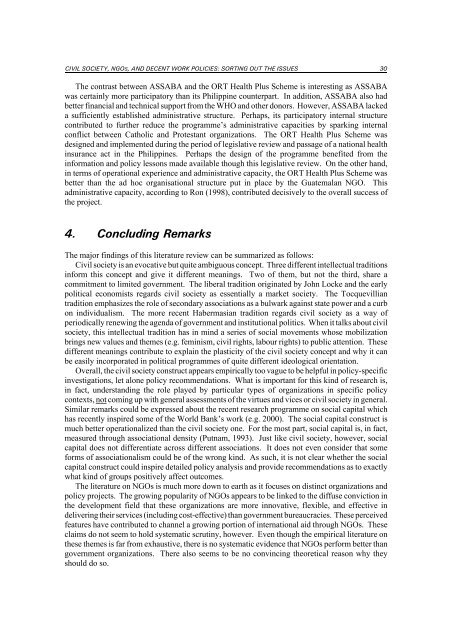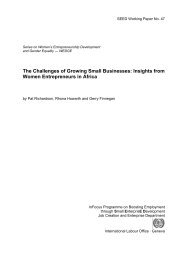Civil Society, NGOs, and Decent Work Policies: Sorting out the Issues
Civil Society, NGOs, and Decent Work Policies: Sorting out the Issues
Civil Society, NGOs, and Decent Work Policies: Sorting out the Issues
You also want an ePaper? Increase the reach of your titles
YUMPU automatically turns print PDFs into web optimized ePapers that Google loves.
CIVIL SOCIETY, NGOS, AND DECENT WORK POLICIES: SORTING OUT THE ISSUES 30<br />
The contrast between ASSABA <strong>and</strong> <strong>the</strong> ORT Health Plus Scheme is interesting as ASSABA<br />
was certainly more participatory than its Philippine counterpart. In addition, ASSABA also had<br />
better financial <strong>and</strong> technical support from <strong>the</strong> WHO <strong>and</strong> o<strong>the</strong>r donors. However, ASSABA lacked<br />
a sufficiently established administrative structure. Perhaps, its participatory internal structure<br />
contributed to fur<strong>the</strong>r reduce <strong>the</strong> programme’s administrative capacities by sparking internal<br />
conflict between Catholic <strong>and</strong> Protestant organizations. The ORT Health Plus Scheme was<br />
designed <strong>and</strong> implemented during <strong>the</strong> period of legislative review <strong>and</strong> passage of a national health<br />
insurance act in <strong>the</strong> Philippines. Perhaps <strong>the</strong> design of <strong>the</strong> programme benefited from <strong>the</strong><br />
information <strong>and</strong> policy lessons made available though this legislative review. On <strong>the</strong> o<strong>the</strong>r h<strong>and</strong>,<br />
in terms of operational experience <strong>and</strong> administrative capacity, <strong>the</strong> ORT Health Plus Scheme was<br />
better than <strong>the</strong> ad hoc organisational structure put in place by <strong>the</strong> Guatemalan NGO. This<br />
administrative capacity, according to Ron (1998), contributed decisively to <strong>the</strong> overall success of<br />
<strong>the</strong> project.<br />
4. Concluding Remarks<br />
The major findings of this literature review can be summarized as follows:<br />
<strong>Civil</strong> society is an evocative but quite ambiguous concept. Three different intellectual traditions<br />
inform this concept <strong>and</strong> give it different meanings. Two of <strong>the</strong>m, but not <strong>the</strong> third, share a<br />
commitment to limited government. The liberal tradition originated by John Locke <strong>and</strong> <strong>the</strong> early<br />
political economists regards civil society as essentially a market society. The Tocquevillian<br />
tradition emphasizes <strong>the</strong> role of secondary associations as a bulwark against state power <strong>and</strong> a curb<br />
on individualism. The more recent Habermasian tradition regards civil society as a way of<br />
periodically renewing <strong>the</strong> agenda of government <strong>and</strong> institutional politics. When it talks ab<strong>out</strong> civil<br />
society, this intellectual tradition has in mind a series of social movements whose mobilization<br />
brings new values <strong>and</strong> <strong>the</strong>mes (e.g. feminism, civil rights, labour rights) to public attention. These<br />
different meanings contribute to explain <strong>the</strong> plasticity of <strong>the</strong> civil society concept <strong>and</strong> why it can<br />
be easily incorporated in political programmes of quite different ideological orientation.<br />
Overall, <strong>the</strong> civil society construct appears empirically too vague to be helpful in policy-specific<br />
investigations, let alone policy recommendations. What is important for this kind of research is,<br />
in fact, underst<strong>and</strong>ing <strong>the</strong> role played by particular types of organizations in specific policy<br />
contexts, not coming up with general assessments of <strong>the</strong> virtues <strong>and</strong> vices or civil society in general.<br />
Similar remarks could be expressed ab<strong>out</strong> <strong>the</strong> recent research programme on social capital which<br />
has recently inspired some of <strong>the</strong> World Bank’s work (e.g. 2000). The social capital construct is<br />
much better operationalized than <strong>the</strong> civil society one. For <strong>the</strong> most part, social capital is, in fact,<br />
measured through associational density (Putnam, 1993). Just like civil society, however, social<br />
capital does not differentiate across different associations. It does not even consider that some<br />
forms of associationalism could be of <strong>the</strong> wrong kind. As such, it is not clear whe<strong>the</strong>r <strong>the</strong> social<br />
capital construct could inspire detailed policy analysis <strong>and</strong> provide recommendations as to exactly<br />
what kind of groups positively affect <strong>out</strong>comes.<br />
The literature on <strong>NGOs</strong> is much more down to earth as it focuses on distinct organizations <strong>and</strong><br />
policy projects. The growing popularity of <strong>NGOs</strong> appears to be linked to <strong>the</strong> diffuse conviction in<br />
<strong>the</strong> development field that <strong>the</strong>se organizations are more innovative, flexible, <strong>and</strong> effective in<br />
delivering <strong>the</strong>ir services (including cost-effective) than government bureaucracies. These perceived<br />
features have contributed to channel a growing portion of international aid through <strong>NGOs</strong>. These<br />
claims do not seem to hold systematic scrutiny, however. Even though <strong>the</strong> empirical literature on<br />
<strong>the</strong>se <strong>the</strong>mes is far from exhaustive, <strong>the</strong>re is no systematic evidence that <strong>NGOs</strong> perform better than<br />
government organizations. There also seems to be no convincing <strong>the</strong>oretical reason why <strong>the</strong>y<br />
should do so.
















